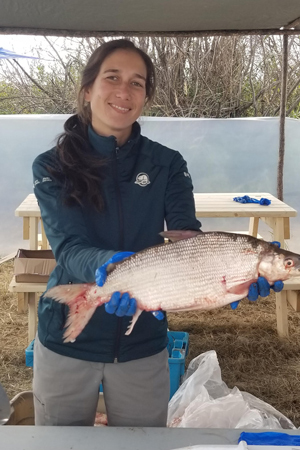Meet Queenie, Ecologist Team Leader

Favourite part of your park?
The Peace Athabasca Delta. I can’t name a specific spot, it’s the expansive enormity of it. When I fly over, sometimes I think of it as a soul – parts may be burned, parts may be flooded, other parts are lush and green, full of life. Some times there’s so much water, sometimes it’s drier. Sometimes the water is murky with sediment, other times its blue. It’s no one thing and it’s forever changing.
I always thought there was land and water, and a bit of shoreline in between. But the PAD is a whole world in that shoreline. There is no land and water, it’s all about the in-between.
Best project/study you’ve gotten to work on?
I’m lucky to be able to work on the Muskrat Project. It’s a hands-on, land-based, collaborative study of muskrat abundance, where you learn just as much (if not more) from talking to our team of trappers than you do from the science. It also is a window into the ever-changing delta. You see how water is connected to everything. You see the changes in people when they reminisce on times when muskrat was plentiful. We had so much water in the delta this year, it’s important for us to get out on the ice and see if the water brings back the muskrat.
Favourite part of your job?
I love finding ways to bring collaboration into projects. For example, this summer, we couldn’t bring in outside researchers to Chip due to COVID, but working closely with Community Based Monitoring Programs, we were able to do the work ourselves. It’s funny because as a younger person, it was the mountain tops and rushing rivers and the challenges of fieldwork. It was coming to the North that changed things, it became about people too because people here are so ingrained with the land.
What do you love about science/tech?
I’ve always had questions about how things work, especially in nature. I love digging in to things, going below the surface…it’s extremely fulfilling to gain a deeper understanding about how our natural world works. It’s also a common trait, across people, across cultures.
Related links
- Date modified :